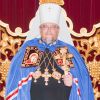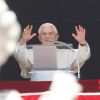Pope Francis could get the Synod he didn’t want
Pope Francis has asked that Sept. 28 be a day of prayer for next month’s meeting of bishops on the family. Given the crisis in family life, the Holy Father called this extraordinary Synod to address the pastoral care of the family in the context of evangelization. However, the preparation for the Synod has been entirely dominated by one topic: Will Catholics who are divorced and have entered a second civil marriage be permitted to receive Holy Communion? At the moment they should not receive Holy Communion, as any Catholic who is in a state of mortal sin is not to receive Holy Communion.
Pope Francis names panel to streamline marriage annulment process
VATICAN CITY - Two weeks before the start of an extraordinary Synod of Bishops on the family, the Vatican announced the formation of a special commission to reform the process of granting marriage annulments.
Pope: Americas need renewed missionary spirit, well-catechized laity
Emissary of hope
As war raged in Syria and an anti-Muslim film ignited violence across the Arab world, Pope Benedict calmly arrived last week in Lebanon as a “pilgrim of peace.”
The 85-year-old pontiff would have been excused if, citing age and security concerns, he’d postponed this trip. During his three-day stay, 25 people were injured and a man killed in Lebanon’s second largest city, Tripoli, during protests aimed at an American film that mocks Islam. The day after he left, missiles from Syrian jets hit Lebanese territory. The region, habitually unsafe, is particularly dangerous right now.
The purpose of the trip was to officially endorse the Apostolic Exhortation that was drafted following the 2010 Synod of Bishops for the Middle East. That task could have been accomplished in the Vatican, of course, and transmitted live worldwide by video-conferencing and Internet technology. Yet the Pope dismissed that option.
Instead, he made the right and courageous decision to stand beside the Christians of the region and, by his physical presence, acknowledge the hardships they endure by living in nations that are often hostile to Christianity. That simple act alone says much about the Pope. Then, addressing some 20,000 young people from several Middle East countries, he urged them to be the vanguard to keep Christianity alive in the lands of its birth.
Middle East Christians, facing social and economic discrimination and seeking safety for their families, have been emigrating in droves to Europe and North America. At the current pace, Christianity might virtually disappear from the region in a generation. It is asking much of young Christians to endure financial and religious hardship, but that is exactly what the Pope implored. To be effective, the message had to be delivered in person.
“I am aware of the difficulties you face daily, on account of instability and a lack of security, and your sense of being alone and on the margins,” he said. But, he added, “You are meant to be protagonists of your country’s future.”
The Pope’s Apostolic Exhortation lays a common-sense framework for Middle East Christianity to endure. It emphasizes dialogue, respect, equality, tolerance and forgiveness among Christians, Muslims and Jews, while denouncing secularism and fundamentalism. The Pope urged young people to never be afraid or ashamed of being Christian and he affirmed their right to religious liberty, to live publicly as Christians and to participate fully in civil life.
The Pope arrived in Lebanon as a pilgrim of peace but departed as an emissary of inspiration and hope. He ignored the latest regional upheaval and chose boldly to stand among the anxious Christians to let them know in person that he will not abandon them. That may have been the most important message of all.
Orthodox leader: North's America's churches can be example for Ukraine
PORTAGE LA PRAIRIE, Manitoba - Catholic and Orthodox churches in Canada and the United States can be an example for their counterparts in Ukraine, Canada's top Ukrainian Orthodox leader told the Ukrainian Catholic Synod of Bishops.
Ukrainian Orthodox Metropolitan Yurij of Winnipeg, addressing the worldwide synod Sept. 10, told the bishops it was "evident that our God is blessing us and helping us develop this better relationship."
"We also pray that in Ukraine this same attitude will develop as well," he said at the first meeting of the synod. The synod is private, but part of its initial session was open to media.
Metropolitan Yurij told several dozen Ukrainian Catholic bishops that the North American Catholic and Orthodox bishops have worked through the "animosity" that once marked relations between their Churches, and they now collaborate.
"In Ukraine, they have to go through the same kind of process," he said, and the bishops outside Ukraine must be patient with their brothers.
While the majority of Ukrainians are Orthodox, they are divided into three Churches: one in communion with the Russian Orthodox Church, one with a patriarch in Kiev and the third known as the Autocephalous Ukrainian Orthodox Church.
The forced unification of the Ukrainian Orthodox Church with the Moscow Patriarchate of the Russian Orthodox Church in the 1940s "is one of the principal problems," the metropolitan said.
The 2010 election of Ukrainian President Viktor Yanukovych, a member of the Orthodox Church in communion with the Moscow Patriarchate, appears to have fueled long-standing tensions between Orthodox loyal to Moscow and those who support an independent Orthodox Church in Ukraine. Yanukovych has worked to strengthen ties with Russia.
Metropolitan Yurij did not mention politicians. However, he did note that the Russian-affiliated Ukrainian Orthodox Church is the only one canonically recognized by the Ecumenical Patriarchate of Constantinople. So, for instance, when Patriarch Filaret of the Ukrainian Orthodox Church-Kiev Patriarchate visited Canada in April, Metropolitan Yurij did not meet with him.
"I have directors also," he said, referring to the ecumenical patriarch, considered first among equals of Orthodox leaders. "I am part of the community of the Orthodox, and he (Patriarch Filaret) is not recognized as a patriarch, so I could not meet him."
Archbishop Sviatoslav Shevchuk of Kiev-Halych, Ukraine, the elected head of the Ukrainian Catholic Church, told Metropolitan Yurij he often finds himself caught in the middle of the delicate situation in Ukraine.
Shevchuk deals with leaders of all three Ukrainian Orthodox churches. Yet every time he has contact with someone from one of the non-canonical Ukrainian Orthodox Churches, "right away a letter goes from Moscow to Rome" asking why the Ukrainian Catholic Church is collaborating with them.
"Directly or indirectly ... I end up being a kind of a go-between between the Orthodox Church and the Roman Catholic Church," he said.
Shevchuk said he, like his predecessor, Cardinal Lubomyr Husar, believes that "we can and we must be ambassadors of the whole Kievan Church," a term used to refer to all Eastern churches based in Ukraine.
Metropolitan Yurij and Winnipeg Archbishop James Weisgerber thanked the synod members for inviting them to the opening session and to the previous day's Divine Liturgy.
Weisgerber, former president of the Canadian Conference of Catholic Bishops, told them, "Sometimes we get the impression that — because the Roman Catholic Church is so large — that it has nothing to learn from anyone else.
"This is a great, great mistake. Often the smallest have the most important things to say," the archbishop said.
The synod was scheduled to meet behind closed doors in Portage la Prairie until Sept. 15 before a public closing celebration in Winnipeg Sept. 16.
VATICAN CITY - Catholics who act like their faith has nothing to do with daily life and a church structure that is more bureaucracy than service are two impediments to the church's ability to proclaim faith in Jesus, said the working document for the next world Synod of Bishops.
"Every one of the church's actions has an essential evangelizing character and must never be separated from the duty to help others encounter Christ in faith," said the document that will guide the work of the synod, scheduled for Oct. 7-28 at the Vatican.
Pope Benedict XVI chose as the synod's theme: "The New Evangelization for the Transmission of the Christian Faith."
Preparing for synod, bishops look at role of family in evangelization
VATICAN CITY - Making final preparations for the world Synod of Bishops on new evangelization, a committee of cardinals and bishops discussed how difficult it is today to transmit the faith to others.
"There was talk about the 'current fruitlessness of evangelization,' including because of the presence of certain influences from modern culture that make the transmission of the faith particularly difficult," said a Vatican press release issued Feb. 27.






